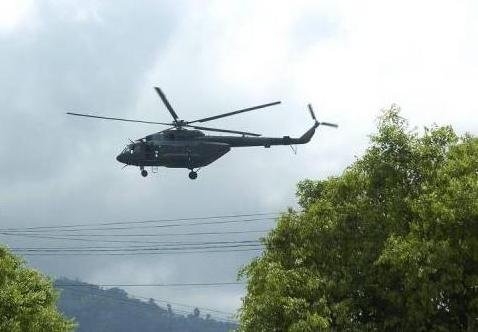Authorities in Costa Rica have five men believed to be part a transnational criminal group that used helicopters to transport drugs, arms and money, highlighting the country’s inability to deal with the growth of international drug trafficking within its borders.
The detention of the men comes after months of investigation into the illicit movement of helicopters in the country, which prosecutors say is being managed and paid for by a Mexican cartel and assisted by members of the Honduran military.
The operation over the weekend saw the arrest of three middle-aged brothers, a young accomplice and a government official who allegedly alerted the group to police operations.
Two helicopters were seized at a farmhouse near the Caribbean port city of Limon, alongside two of the suspects, reported La Nacion. The other suspects were picked up during 12 other raids that also turned up $35,000 on the Caribbean side of Costa Rica near the border with Nicaragua. Nine clandestine landing fields had previously been found, resulting in the detention of three other men including a Colombian pilot. Various arms, including AK-47 rifles, have been seized, reported La Vanguardia Liberal.
The investigation was sparked by various reports of a low-flying helicopter in the northern Caribbean region, reported La Nacion. According to Costa Rica’s Judicial Investigation Unit, the helicopter was bringing drugs from Colombia through Panama then refueling in Costa Rica, before carrying on to Honduras via the central Nicaraguan city of Juigalpa.
Celso Gamboa, director of the Intelligence and Security Unit, said the group was taking advantage of the fact that Costa Rica lacked the capacity to monitor illicit flights. Last week President Laura Chinchilla promised to buy more radars and two helicopters to combat this type of drug trafficking.
InSight Crime Analysis
The use of Costa Rica as a drug trafficking route has grown significantly in recent years, as drug routes through Central America have gained importance. The country is ill-equipped to deal with the growth of transnational crime, according to the US State Department’s 2013 International Narcotics Control Strategy Report. Though it does have a Coastguard, Costa Rica has no standing army or air force, so lacks the ability to effectively monitor airspace. This would make it an ideal location for drug flights to land and refuel.
SEE ALSO: Coverage of Costa Rica
The use of helicopters make this case unusual, given that they are very loud and expensive to run. It lends credence to the notion that a Mexican group was running the operation, as it must have been a very high-profit activity to make the use of helicopters viable.

